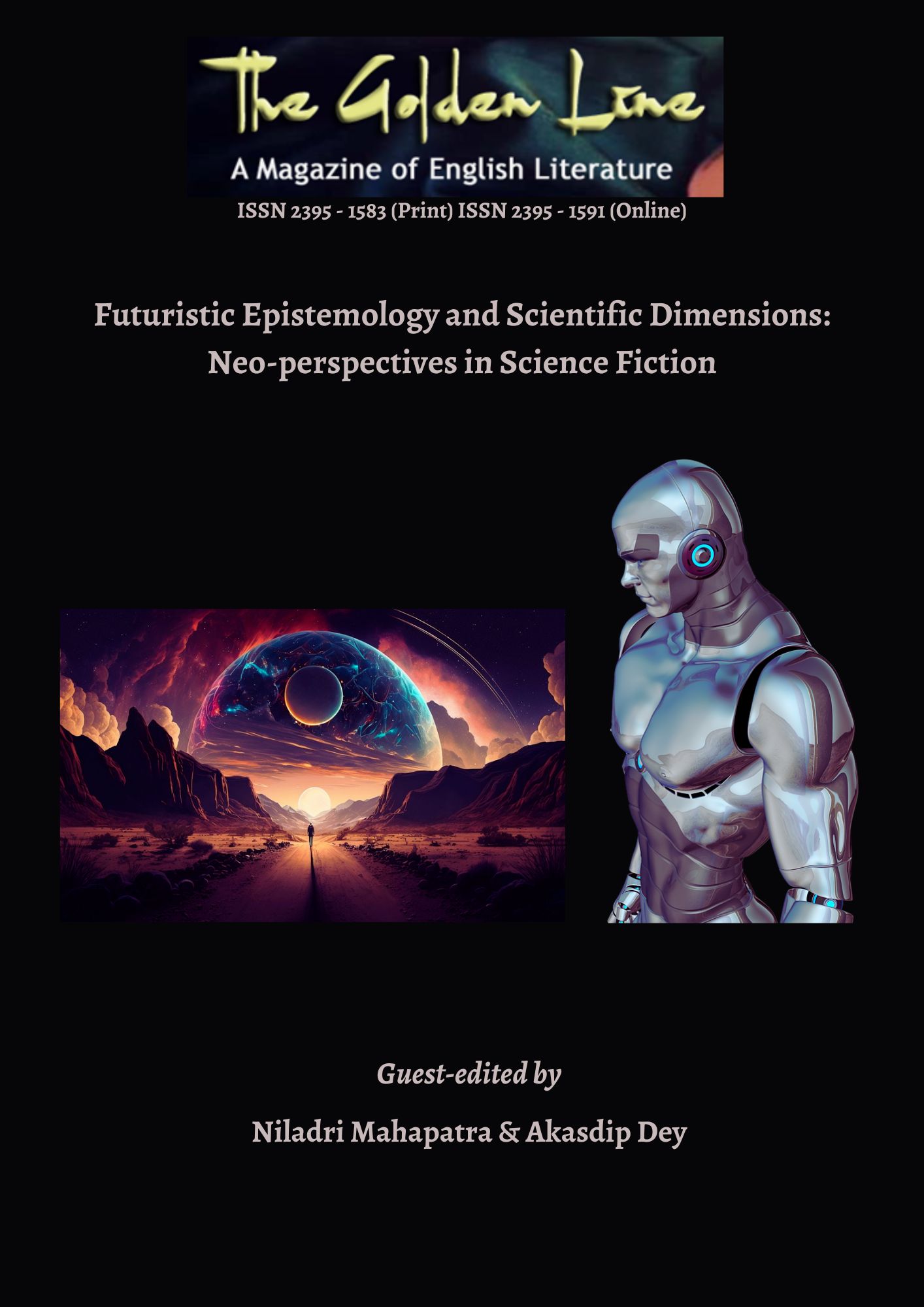Niladri Mahapatra & Akasdip Dey
State Aided College Teachers, Dept. of English, Bhatter College Dantan
Science fiction, known as a popular genre by the consensus of many opinions, is originally a touchstone that represents a cognitive dissonance by throwing all the readers in conundrum which creates a clash between fiction and truth. So, science fiction is crucial to examine the cognitive mechanism with scientific truths that provides plausible devices as catalysts for our beliefs about the truth in science fiction and truth of science fiction. Even, science fiction as an important genre expostulates that the imagination is more sui generis than the knowledge; and proves how imaginative paradigm of science fiction has an authentic relation with the epistemology of science.
The word “fiction” has been always encountered as a derelict and baggy giant, a prose narrative form that contains many different genres, multiple varieties from fact to fantasy and undergoes from social explorations to several experimentations with endless generic utilizations and popular satieties. But etymologically the meaning of the word ‘fiction’ is insidious. Its Latin root “fingere” means to lie, pretend or make believe and its Greek counter parts “plattein” and “poieo” mean the right way to lie and telling lies dexterously. So the reality depicted by fiction is imagined reality. Even, it is believed that the word “fiction” seems to be an antonymic and hyperbolic apparition of “facts”. But, such encounters to fiction had raised a hot bed of controversies. Scholars illustrated their opinions being divided into separate wings. One wing believed that the fictional realm does not contain any truth value, nor does it arbitrate with any episteme but mere imitation. On the other hand, another wing of critics rejected the first one and gave attributes both truth and knowledge to the fictional discourse by arguing that the observations of the first group are based on the empirical paradigm of the actual world. These critics believe in possible reality which is beyond the actual reality. They try to confirm the metaphysical reasoning in which impossibility is a very possible word. As it is unacknowledged, it can be metaphysically present, always leads to another possible mode. They wished to claim fictionality can’t pure fictitious as it captures a metaphysical realm where reality is articulated and achieved via unreality through the discourse of imagination, which has a metaphysical-ontological status, and with the help of artistic deception. By rigorous arguments from modal logic, pragmatics and many other branches of knowledge, this idea evolved through the past century. So, involved in the quest to find out the truth in fiction and truth of fiction is a very perplexing exercise. Both of them have very specific desirable status. So, defining fiction as mere untruth is a drastic and fraudulent oversimplification. All major forms of fiction, including myth, legend, and folklore, have greater ambitions than merely telling lies. The universality of fiction reflects its aptness, and becomes a system with unflinching cognition that there is more truth than fact. The fiction is not the fact and simply variant from fact, but it is not “nothing” at all and has the volition to be the fact which it is not. This volition makes fiction other which has a nature of its own. And, it does not only negotiate with “what is”, but also tries to deal with “what might be” and “what ought to be”. Thus, the discourse of fiction has multidisciplinary phenomenon for people to handle it most carefully. And, it has become increasingly fulcrum to human society with a certain degree of cohesion. Now, adding science to fiction is making it more interesting as science, being fictionalized, affirms that fiction is the truth, the whole truth and nothing but the truth. Because science, a term whose Latin equivalent, “scientia”, means “knowledge”, is a method that can easily be anatomized and lobotomized into three components – observation, experiment and speculation. This speculative nature of science opens the door for fiction to come in and fictionalize the science. So, science, being fictionalized, occupies a great place in fiction and produces a key literary genre known as science fiction which truthfully represents the counterfactual ideas of fiction, and the fictional treatments of science.
Understanding the Genre Science Fiction
The proliferative emergence of the science fiction genre is the most emphatic literary reverberation in the history of science which is a dynamic force in evaluating human thought – via its technological derivation and practical endeavor. The term “science fiction” was coined by the Scottish poet William Wilson in A Little Earnest Book upon a Great Old Subject to yield a response of his reading of Robert Hunt’s The Poetry of Science. In 1920s the term was adapted for the purpose of publication with an identified denomination by American magazines. They decided to give the name “science fiction” to the fiction in which one of the main topics was science and the texts would speculate and imagine the themes that emanates from scientific ideas. It is not important that they express the truth or the fact; the novels follow the scientific method but only in a fictional context, answering the question “What if?” For instance, a science fiction may deal with the more or less rational but imagined enhanced technological world where robots, transhumans and humans are living together in the future. For reaching those conclusions, the author must analyze how the world is functioning right now and must try to guess how the future events would take place accordingly. In a sense one could argue that this is the reason why the posthumanist thinking lies at the heart of science fictions.
Science fiction has had many definitions and none of them is copacetic. However, the name “science fiction” is an oxymoronic phrase and for that reason it has detractors. But, we might call science fiction as the fictional exploration of the unknown – a genre whose objective is to portray the ideas that cover artificial intelligence, cyber worlds, futuristic societies with advanced technologies, creatures from other worlds, parallel and multi-universe, travel between planets or in time etc – all of those which are related to posthuman condition. Even, science fiction as a genre has multitudinous interpretations under the clutches of the thinkers to arrive at a point which is not constant rather constantly signifies another approach. According to Adam Roberts, “Definitions of SF, like histories of SF, are manifold not because critics and historians of the form are confused, or can’t agree on key points, but because SF itself is a wide-ranging, multivalent and endlessly cross-fertilising cultural idiom” (2). On the other hand, Hugo Gernsback considers it as a synthesis of romance science and Robert Heinlein regards it as a realistic speculation of future events. To define more precisely, Darko Suvin descried it a genre based on an imagined alternative of readers’ psyche functioned by estrangement and cognition. Popularized by Bertolt Brecht, the word estrangement means defamiliarisation or alienation. It is a technique that helps us to make familiar a subject by making it unfamiliar. But, estrangement is not the only qualitative characteristic of science fiction to comprehend all that we should. To delve into the norms of scientific erudition, Suvin posits the significance of cognition by referring that it can weave a chain between the world that has been experienced of the reader and the fictitious world that has been narrated by science fiction. Based on the reciprocity of fact and fiction, cognitive estrangement of science fiction isolates us from the naturalistic world but at the same time connects us with the myriad links that constitute fictitious world cognitively. Unlike imaginative fiction, science fiction is a cognitive prose narrative based on scientific visualization, epistemological and theoretical paradigm, cause and effect relationship and speculation in its plot, characters, settings and themes. And, the use of technology rationalizes the imagination and predicts that how with help of technology our society is changing to a posthuman world. Issac Asimov contends that science fiction negotiates with the impact of scientific advance upon human beings – it is impossible to elevate for human beings without exploring the kinship between humans and the indiscriminate scientific forces that spawned plentiful life. And, the phenomenal success of science fiction as a popular genre not only bespeaks its entertaining and succulent valorization but also promulgates its caliber to fascinate and reformulate the anthropogenic values in a metamorphic sphere.
For publishing this themed issue of our magazine The Golden Line, we have selected the futuristic epistemes and new scientific dimensions as themes and topics to acknowledge the emergence and evolution of science fiction worldwide. By choosing so many scholarly articles for this issue, the magazine sets a goal to cover many perspectives of this genre. For instance, while Darko Suvin looks back to his former coined term “novum” and presupposed concept of it to interpret science fiction again from societal to epistemological new findings, John Ryan totally focuses on phytocritical reading of two famous speculative novels to justify the botanical hypothesis for understanding plant perspectiveness. On the other hand, Gautam Majhi’s highlight on dystopia opens a new door to look at the matter of apocalypse in a new way. Suham Guha chooses something different to discuss. By reflecting on the emergence of Kalpabiswa which revives the tradition of SF magazines of Bengal, Guha elucidates the ineluctable impact of this SF magazine in the historiography of Bengal science fiction. Determining the binary paradigm, Rajkumar Bera’s analysis of Neal Stephenson’s classic sci-fi Snow Crash reverberates meticulously the agathokakological approach of a futuristic society through the inevitable conflict between secular individualism and religion. Thus, with so many research articles which cover philosophical, futuristic, aesthetic, scientific perspectives of science fiction, with so many interviews of renowned scholars and writers and also with a creative section, the issue tries to explore the motifs, aims, hypothetical and epistemological discourse of sci-fi which is the best medium to witness and understand the amelioration and evolution of this technocratic world.
Works Cited
Bould, Mark, editor. The Routledge Companion to Science Fiction. Routledge, 2009.
Clarke, Bruce, and Manuela Rossini, editors. The Routledge Companion to Literature and Science. Routledge, 2011.
Dinello, Daniel. Technophobia!: Science Fiction Visions of Posthuman Technology. University of Texas Press, 2005.
Jaynes, Julian. The Origin Of Consciousness In The Break Down Of The Bicameral Mind. Houghton Mifflin Company, 1976.
Luokkala, Barry B. Exploring Science Through Science Fiction. Springer, 2014.
Roberts, Adam. Science Fiction. 2nd ed. Routledge, 2000.
Seed, David. Science Fiction: A Very Short Introduction. Oxford University Press, 2011.
Stableford, Brian. Science Fact and Science Fiction: An Encyclopedia. Routledge, 2006.
Westfahl, Gary, editor. Science Fiction and the Prediction of the Future Essays on Foresight and Fallacy. McFarland & Company, 2011.
[Volume 5, Number 1, 2023]


